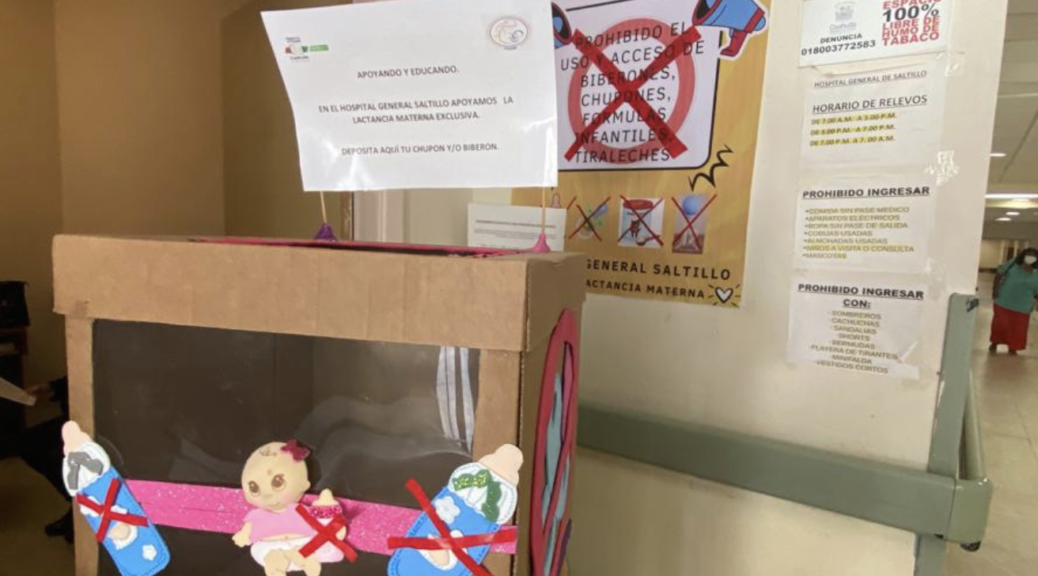
Ban bottles in the hospital to promote breastfeeding?
Two hospitals in Mexico – Hospital Universitario and Hospital General de Saltillo, in Coahuila – have been recently in the news for banning the entry of all baby bottles, pacifiers, formula milk, and breast pumps to families with babies born or admitted into their facilities. Families and visitors will not be able to access the hospital with any of these items, and if they do bring them, they must be deposited in a box at the entrance, as seen in the photo above.
The news article says that the posters warn that the “use and access” of these objects inside the hospital is not allowed. In one of the notices displayed at the General Hospital, there is an additional text next to the sign stating the following: “Supporting and educating. At Saltillo General Hospital, we support exclusive breastfeeding”.
Hospitals have a difficult mission when it comes to increasing breastfeeding rates in their facilities, and we know that many professionals are making efforts to work along these lines. This work needs to be acknowledged, and in some hospitals, there has been a real shift in the right direction, changing the outdated protocols of the past. Finding a way to achieve this is not always easy.
We, the LactApp team, believe that the role of healthcare professionals is to accompany each mother in her individual choices, to show empathy and achieve the best possible training to help them to achieve their breastfeeding goals. Whether it is exclusive breastfeeding, mixed feeding or artificial formula feeding. To give as much information as possible to mothers so that they can achieve their desired path. We believe that decisions such as those of these hospitals blame mothers who opt for different feeding methods other than exclusive breastfeeding and also cause enormous guilt to those who do not manage to establish it, in many cases because they have not been able to access expert support. Putting the mother at the centre means always asking first what she wants to do.
Beyond these considerations, it is questionable to assume that all these items prevent mothers from exclusive breastfeeding. Not only can they be compatible with breastfeeding, but some can be very helpful in coping with the difficulties during the breastfeeding journey. It does depend on how, when and for what purpose they are used.
A breast pump, one of the forbidden objects, can be necessary and very useful in the first hours and days to maintain milk supply while the baby does not latch on well or to extract milk to supplement with the finger-syringe method (when supplementation is necessary). Offering a pacifier should be a family decision, and rather than forbidding the use of bottles, mothers who choose to formula feed should be explained the correct techniques to do so, facilitating a slow milk flow to reduce the risk of breast rejection.
We have asked the Mexican lactation consultant and journalist Miriam del Toral, who has helped us to put this news from her country into context:
This fact is not new, since 2014 there are several public hospitals that are trying to implement in their maternity units the Baby Friendly Hospital Initiative (BFHI) certification and have taken similar steps. Step 9 to obtain this certification requires avoiding the use of pacifiers and bottles, however, this should not be done in a clear way or with assertive communication towards mothers. Approached in this way, they can be very extreme and cause discomfort for mothers.
In fact, what is forbidden is the use of bottles and pacifiers in a proactive way by healthcare professionals with babies in their facilities. The recommendation is that if a mother comes to the practice with a bottle, other feeding methods are suggested and she can be taught how to use them and will be invited to a breastfeeding support group. But if she does not wish to do so, she needs to be respected and never told off.
In any case, these measures are in stark contrast to what is being done in Mexico’s private hospitals, where there is no culture of breastfeeding promotion. There are few private hospitals where breastfeeding support is offered in the first hours of the baby’s life. And they continue to promote the separation of mother and baby at night so that the woman can rest, offering a bottle of formula to the babies every three hours. Formula is heavily favoured, and other ways of feeding other than bottles are also not offered if necessary. This is where I think we have to focus our attention on demanding that private hospitals join in the promotion of breastfeeding and that public hospitals review how they communicate with mothers.
In professional breastfeeding care, technical knowledge is almost as important as the ability to accompany families with empathy and non-judgment, affirmative communication and respect.